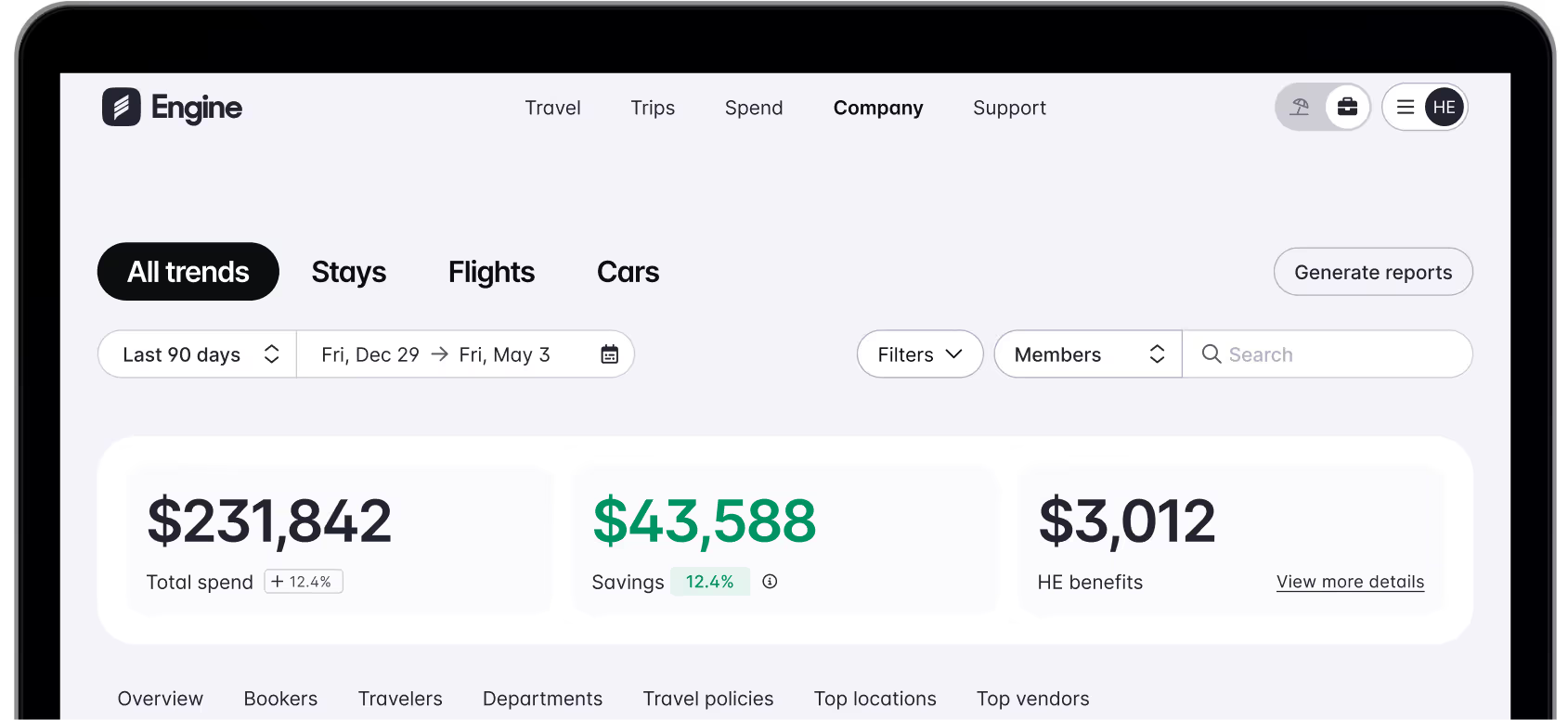Non-Cash Expenses: Definition, Examples & Reporting Tips

You're staring at your month-end reports and something's off. Your cash flow shows $47,000 available, but your P&L says the Eastport warehouse build is $23,000 over budget.
Three weeks of crew hotel stays that your independent contractors put on personal cards, plus $8,000 monthly equipment depreciation you forgot to factor into your cash position.
With rising accommodation costs and tighter project margins, these timing gaps hit harder than ever.
Meanwhile, project managers are asking if you can afford to extend the timeline, and you can't give them a straight answer because your financial statements don't show your cash reality.
If you manage finances for project-based work, you know this frustration. Non-cash expenses create a fog between what you think you can spend and what you have.
What are Non-Cash Expenses?
Non-cash expenses are costs that reduce your profit on paper but don't require immediate cash payment. If you've ever looked at your bank account and thought, "Where did all my money go?" while your P&L shows you're profitable, then you have an idea what these expenses entail.
These phantom costs mess with your head, making you think you're broke when you've got cash, or rich when you're about to hit a wall.
Think of them as paper charges that lower your profit but leave every dollar of cash right where it was.
These expenses hit project-based industries harder than office-based businesses.
When you're managing construction crews, manufacturing operations, or field service teams, you're dealing with expensive equipment that depreciates, contractors who front their own expenses, and project travel costs that get accrued before you pay them.
Your income statement includes these noncash expenses, making your projects look less profitable than they are from a cash perspective.
The disconnect gets worse in project-based work. You're juggling multiple active projects with different timelines, equipment usage, and contractor payment schedules.
Engine’s direct billing means your financial statements match your cash position without the reimbursement lag that creates phantom budget holes.
5 Types of Non-Cash Expenses Hitting Your Project Budgets
Equipment costs money and contractors submit expenses late. These non-cash expenses hit your books and your bank account at different times. Here are 5 types that make profitable projects look like money-losers:
1. Equipment Depreciation: You bought that excavator for $200,000 and your bank account took the hit immediately, but accounting spreads the cost over five years as depreciation. When equipment gets damaged on site, you write down the loss right away while waiting months for insurance money.
2. Accrued Travel Expenses:: When contractors book hotels on personal cards and submit expenses weeks later, you're recording the cost now but paying later, especially painful with 2025's inflated accommodation costs
3. Bad Debt Provisions: You set aside funds for potentially uncollectible invoices, creating an expense that reduces your net income without touching your cash until you write off the debt
4. Deferred Compensation: Your annual software licenses hit your bank account in January but get expensed monthly all year. Meanwhile, project completion bonuses get expensed monthly but won't hit your cash until the job finishes. These create the same cash flow confusion: your monthly P&L doesn't match your actual cash timing.
5. Warranty Provisions: You estimate future warranty costs and record them as current expenses, preparing for cash outflows that might happen months later
Engine's project-code tagging catches travel expenses as they happen—turning the biggest variable non-cash expense into predictable, trackable costs that align with your project timelines.
How to Spot Discrepancies and Errors in Your Non-Cash Expenses
Non-cash expenses create two kinds of problems in project-based work. First, you need to properly identify and reconcile legitimate non-cash items so your cash flow analysis is accurate.
Second, you need to watch for fraudulent expenses that hide in the complexity of non-cash accounting. Both issues can derail your project budgets if you don't catch them early.
Finding Non-Cash Transactions on Your Statements
Your identification starts with the cash flow statement. Find the operating section and look for 'add-backs'—that's your non-cash expenses. Common add-backs include depreciation, amortization, and changes in accrued liabilities.
Take net income from your income statement, then add back all the non-cash expenses to see your operating cash flow. If your net income shows $1 million but you have $200,000 in equipment depreciation and $150,000 in accrued contractor expenses, your operating cash flow is $1.35 million.
Skip this and you'll make payroll decisions based on phantom numbers.
Your monthly reconciliation process:
- Pull your cash flow statement's operating section
- Identify each add-back item
- Cross-reference with project budgets
- Flag unusual variances for investigation
Target expenses with no cash outflow. Watch for balance sheet changes in depreciation and accrued liabilities.
The key difference: cash expenses like wages, fuel, and supplier invoices hit both your income statement and your bank account immediately.
Non cash expenses items like depreciation and accrued travel costs hit your income statement but create timing gaps before affecting your cash position.
With Engine's dashboards, your travel reconciliation gets simplified with consolidated billing. No more month-end surprises in your non-cash adjustments or contractor reimbursement requests that don't match your project records.
Identifying Travel Fraud Disguised as Non-Cash Expenses
Non cash costs create accounting complexity that fraudsters exploit. Watch for these warning signs:
- Travel expenses growing faster than other project costs
- Large bad debt provisions appearing after high-travel projects
- Mysterious asset impairments coinciding with travel spikes
- Contractor reimbursement requests that don't match project timelines
Site supervisor bills weekend hotel stays for "concrete curing oversight" that never happened. The $3,200 monthly loader depreciation hides the hotel spike until you cross-check expense reports against project schedules.
Family trip to the coast disguised as equipment monitoring. Small dollars per incident, but tightening controls saves thousands over time.
Your fraud prevention audit trail should cross-check contractor travel receipts against project schedules, compare travel expense accruals to crew deployment, and flag duplicate or inflated accommodation charges.
Monitor personal card reimbursements for pattern irregularities. Legitimate contractor expenses follow project schedules while fraudulent ones often show random timing or unusual spending patterns.
Engine builds project tracking directly into the booking flow. Every transaction gets tagged to specific projects with real-time approval workflows, eliminating the gray areas where fraudulent charges hide among legitimate non cash compensation and accrued expenses.
Adjust Your Cash Flow Analysis for Strategic Decisions
Build a 90-day rolling forecast that separates non-cash items from cash requirements:
- Month 1: Actual cash in and out (ignore depreciation and accruals)
- Month 2: Committed cash expenses (crew hotel bookings, approved contractor travel)
- Month 3: Probable cash expenses (overtime lodging, weather delay accommodations)
Before approving new projects, calculate your true cash position after pending contractor reimbursements. Can you handle payroll and materials at 2025 cost levels if this project has overruns?
Remove depreciation from project profitability calculations when making strategic decisions, focus on cash generation.
That decision to put the crew up in extended-stay hotels vs. daily rates should be based on cash flow impact, not how the prepaid deposits affect your P&L.
Factor in the standard contractor reimbursement lag when planning working capital—most independent contractors submit expenses two to three weeks after incurring them.
Engine's expense tracking means your strategic decisions are based on cash impact, not accounting estimates. When travel expenses flow directly to your project codes without reimbursement delays, your cash forecasts finally match reality.
Quick implementation checklist:
- Separate cash vs. paper expense codes in your system
- Set up monthly cash-flow reconciliation routine
- Create alerts for unusual expense variances and update forecasts with cash position
Create Reports That Don't Confuse Your Project Managers
Your project managers want clear cash information for their decisions. Build a two-tier reporting system that serves different stakeholders without creating confusion.
Cash Reality Dashboard (what you can spend):
- Available cash by project code and crew location
- Pending contractor hotel reimbursements hitting next month
- True cost-to-complete including remaining crew accommodation needs
Financial Compliance Report (what the books say for auditors):
Skip the finance jargon with project managers. Don't say "accrued expenses"—say "money we owe but haven't paid yet." Don't say "depreciation impact"—say "equipment costs spread over time."
Engine's integrated dashboards automatically separate cash reality from accounting entries, so your project managers get straight answers about what they can spend without wading through finance jargon or non-cash adjustments.
Take Control of Your Cash Reality With Direct Billing
Non-cash expenses don't have to create confusion between your books and your bank account. Start by identifying and tracking your major non-cash expense categories.
Run monthly cash checks using your cash flow statement. Match paper charges to project budgets and investigate weird numbers before they become bigger problems.
Build two reports. One for project managers who need cash numbers, another for auditors who want the books.
Build fraud detection into your crew travel expense review by cross-checking hotel receipts against actual job site schedules and flagging weekend stays when no work was scheduled.
Make decisions based on cash reality, not accounting fiction. Remove depreciation from project profitability calculations, factor in contractor reimbursement timing, and separate cash impact from P&L impact in your planning.
Ready to eliminate the travel expense reimbursement lag that creates budget holes in every project? Engine makes sure your travel expenses finally match your cash position. Engine makes sure financial statements finally match your cash position.
See how Engine handles project-based travel without the cash flow confusion.

Frequently Asked Questions
How often should I reconcile non-cash expenses for project-based work?
Run reconciliations monthly, but flag major variances weekly during active projects. Waiting until project completion means you'll miss cash flow problems that could kill your next bid.
Do non-cash expenses affect how I bid future projects?
Yes. Ignoring depreciation in your cost estimates leads to underbidding by 10-15% on equipment-heavy jobs. Factor in the real wear-and-tear costs, not just the accounting depreciation.
What's the biggest mistake companies make with non-cash expense tracking?
Mixing paper charges with cash expenses in the same cost codes. This makes it impossible to see your real cash position when project managers ask for budget updates.


.jpg)



.jpg)







.avif)









.avif)




.avif)





